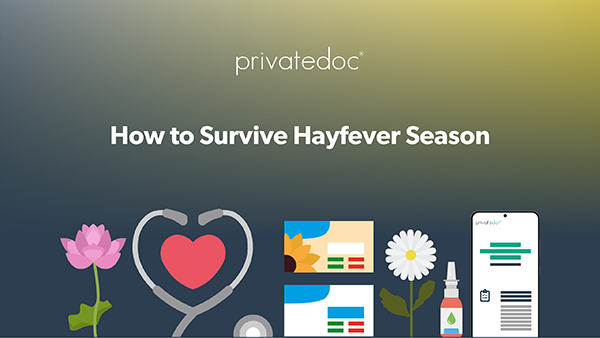Hay fever resources
Resources to help you understand more about living with Hay Fever.
How to Survive Hay fever Season
Don't be a prisoner locked up indoors this summer, learn about the treatments available to help you manage hay fever so you can get out there and enjoy the sunshine.
Frequently asked questions about Hay fever & allergy relief
-
What is hay fever?
Hay fever is essentially an allergy to pollen (tree, grass, weeds, etc.) and is most prevalent from early spring to late autumn. Sufferers are more likely to experience symptoms when the weather is warm, windy or humid as this is usually when the pollen count is at its highest. It is estimated that hay fever affects one in four of the population.
Pollen is a fine powder released by the male region (anther) of a plant. This is then carried either by animals or the wind to the female region (stigma) of a different plant. This process is one of the steps involved in a plants normal reproductive cycle.
Blood tests and skin prick tests can be used to diagnose hay fever; however, this is usually not required as the symptoms are seasonal. In the majority of cases the symptoms will be present from March to September which then disappear during the winter months. This pattern is distinctly indicative of a hay fever suffer and most healthcare professionals can diagnose with a high degree of confidence.
-
What are the symptoms of hay fever?
Symptoms of hay fever can sometimes be confused with those of a common cold. If you have never suffered from hay fever in the past, then it can be difficult to distinguish between the two conditions. Usually though the symptoms of a cold will be limited to a couple of weeks at most whereas symptoms associated with hay fever can last for months.
Symptoms include but are not limited to:
- runny nose or a congested nose
- sneezing and/or coughing
- streaming/watery eyes which can also be itchy and red
- an itchy throat, ears, nose and mouth
- feeling fatigued/tired/exhausted
- Pain - earache, temples, forehead, headache
- loss of smell
If you already suffer from a respiratory condition such as Asthma or COPD, then you may also experience a worsening of respiratory function. This can include but again is not limited to:
- chest tightness
- shortness of breath
- wheeze
In these circumstances a patient may be required to increase the use of their normal inhaler therapy during the hay fever season.
-
What are the treatment options for hay fever?
As there is no cure or preventative therapy for hay fever at present, treatment is aimed at controlling and managing the symptoms. Patients can reduce the severity of their symptoms by trying the following recommended steps first:
- Applying a small amount of vaseline around the opening of the nasal passages can reduce the level of pollen being inhaled
- changing clothes and taking a shower after you return from being outside can limit the time you are in contact with pollen
- staying inside as much as possible - especially on days when the pollen count is known to be high. This includes keeping windows and doors closed. If you are required to go outside, then wear sunglasses and keep your time outdoors to a minimum.
- Sufferers should avoid cutting grass or disturbing grass by not walking on it.
- Vacuum on a regular basis and dust with a damp cloth.
- Avoid having fresh flowers in the house.
- Avoid spending time with pets which have been outdoors as they can transport pollen quite easily.
- Do not smoke and avoid exposure to smoke as these can make symptoms worse.
If these measures do not work then your pharmacy can recommend a wide variety of drugs in the form of nasal sprays, eye drops, tablets, etc. Anti-histamine tablets are the most commonly used treatment option. Tablets can be used as stand-alone therapy for mild symptoms or in combination with steroid based nasal sprays for moderate to severe cases. Eye drops available over the counter can help with localised symptoms for acute attacks or can be used to prevent future symptoms from occurring by using them daily.
Failing this PrivateDoc has a range of prescription only medication which one of our doctors would be more than happy to prescribe after a quick and easy consultation.
-
How does my order arrive?
All our medicines are sent via DPD or Royal Mail in discreet packaging. If we prescribe your medication before 2 pm, your order will be shipped the same day. We provide you with a tracking number so you can track your parcel right to your door.
Care you can count on
We make your medication simple. We understand our patient’s needs and we keep our service simple and transparent in order to help you when you need it most.
We are CQC registered with UK licensed GPs and a 5- star service as standard.
You can find some of our reviews here:
Get Started



